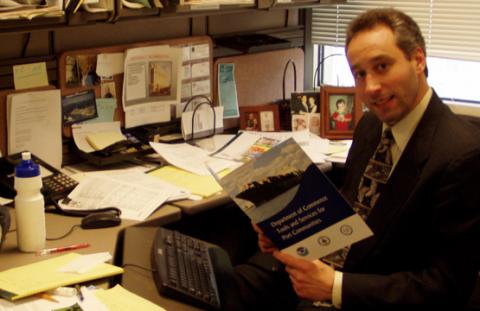
Office of Ocean and Coastal Resource Management (NOAA)
One day I may be reviewing a proposal for a new public access site on one of the Chesapeake Bay rivers and the next I may be working with partners on mapping offshore migration patterns of marine mammals.
Education
- B.A., Economics, Rutgers College
- M.E.M., Masters of Environmental Management, Yale School of Forestry and Environmental Studies
Contact
What is your current job and what does it entail?
I am a regional coastal program specialist working with the states of Maryland and Virginia to implement the Coastal Zone Management Act and supporting efforts to link water quality and land use issues to fisheries health in the Chesapeake Bay. I manage grants totaling over $5M annually, communicate regularly with my state partners, and provide technical assistance and strategic advice to state and local stakeholders on management approaches that balance economic development with coastal resource protection. My areas of expertise include coastal nonpoint pollution, smart growth, coastal resilience, program measurement, and evaluations. I frequently collaborate with other federal agencies such as the Environmental Protection Agency and the National Park Service on special projects and program development and review.
What was the key factor in your career decision?
As an avid fisherman and user of coastal resources, I wanted, to the extent possible, to align my career with a strong desire to see critical coastal natural resources protected.
What do like most about your career?
The passion and commitment of my colleagues. And, the fact that we get to work on tremendously diverse issues, as nearly everything that we do as a society happens along our coasts. One day I might be reviewing a proposal for a new public access site on one of the Chesapeake Bay rivers and the next I might be working with partners on mapping offshore migration patterns of marine mammals.
What do you like least about your career?
The slowness with which decisions are made and actions taken at the federal level, and the lack of interest in fixing basic process and procedural issues.
What do you do to relax?
I love to be out on the water, usually with a fishing rod. I also like to play sports like basketball, football, and volleyball, especially with friends. I cherish time with my two sons as well, sometimes learning a bit about the latest iPod games or viewing silly video clips, but more often outdoors, down by the community pool, or at a swim meet.
Who are your heroes/heroines?
My mom and dad, because they knew how to work hard, laugh with friends, give us their time, and love us no matter what happened, and they taught their four sons to do the same. I marvel at my parents' work ethic and ability to raise four strong-willed boys! As for more famous people, Alexander von Humboldt for an unbelievable array of discoveries.
What advice would you give a student who expressed an interest in pursuing a career in your field?
Focus on mastering the basics of science, math and reading/writing and know that the environmental policy arena needs leaders and teachers like every other field. We need leaders who can influence and motivate change, who can think and communicate across disciplines in an integrative fashion, and who have an ability to work through and learn from failures.
Are career opportunities in your field increasing or decreasing and why?
As we enter the second decade of this century, they seem to be decreasing in government, but government losses may be offset by increases in the not for profit realm. The underlying issues that created the need for environmental management are undoubtedly growing in scope and complexity, but career opportunities in government may not be keeping pace with the issues. However, as environmental issues pervade all aspects of life, many professionals trained in other disciplines such as engineering, architecture and education will likely benefit from developing an understanding of issues related to sustainability, clean water and air, and public health. So, our need to balance growth and development with the protection of natural resources will continue to drive future demand for environmental policy analysts.
What will you be doing 10 years from today?
Last time I said I'd be teaching, perhaps as part of a university extension program or maybe in a more traditional public school setting, but this time around I have to say I'll probably be with NOAA if they'll have me!

